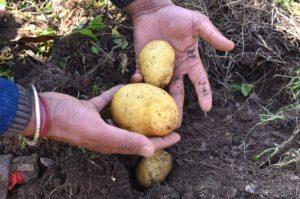Potato Distress Sales in Bengal — Despite widespread distress sales of potatoes by farmers in West Bengal at rates as low as ₹9–10 per kilogram, retail prices in Kolkata remain stubbornly high at ₹22–24 per kilogram. This glaring gap between wholesale and retail rates has sparked concerns over supply chain inefficiencies, poolr market regulation, and the worsening plight of potato farmers across the state.
Price Mismatch Alarms Farmers and Consumers
In several districts including Hooghly, Burdwan, and Bankura, farmers have been selling their produce below production costs due to massive stockpiles and limited procurement. Even at distress sale rates, many are unable to recover the cost of cultivation, which stands at ₹6.50–7.50 per kg. Yet, in Kolkata’s retail markets, consumers are paying nearly three times the price farmers receive.
Agricultural economist Dr. Biswajit Roy from Bidhan Chandra Krishi Viswavidyalaya noted, “This price divergence reflects structural issues in Bengal’s agricultural economy—especially poor marketing infrastructure, weak farmer bargaining power, and layers of intermediaries.”
Record Stockpile: A Double-Edged Sword
This year, the state has seen a record yield of around 110 lakh metric tonnes of potatoes, with over 70 lakh metric tonnes stored in cold storages. However, due to limited interstate trade opportunities and delays in procurement, a large portion of the stock is now stuck, leading to supply saturation and distress sales.
According to the West Bengal Cold Storage Association (WBCSA), farmers have stored nearly 75% of this produce themselves. As cold storage rental periods begin expiring, many are forced to liquidate their stocks at throwaway prices, leading to financial losses and widespread frustration.
Potato Distress Sales in Bengal: Retail Price Control Missing
Despite the glut in supply, urban consumers in Kolkata have not seen any price relief. Retailers claim high transportation costs, storage fees, and supply chain bottlenecks as reasons for the stagnant prices. However, consumer rights groups and agricultural unions argue this discrepancy reflects market manipulation and lack of regulatory oversight.
Pratima Das, a homemaker in Behala, expressed frustration, “When farmers are being forced to sell cheap, why are we still paying so much in the city? There needs to be transparency.”

Farmers Bear the Brunt
Many small and marginal farmers in Hooghly and Burdwan have reported losses exceeding ₹10,000 per acre. Several of them have warned they might not cultivate potatoes next season if prices do not stabilize. In Arambagh, farmers even dumped produce by the roadside in protest.
“I spent over ₹60,000 on seeds, labour, and fertilizer for one acre, and I couldn’t even recover half,” said Tapan Pal, a farmer from Khanakul. “I’m not sure I can afford to do this next year.”


Government Intervention Slow and Limited
The West Bengal government has announced the procurement of 15% of stored potatoes at Minimum Support Price (MSP) to help stabilize the market. It has also proposed integrating potatoes into public distribution and midday meal schemes. However, stakeholders say the response has been too little, too late.
Sunil Kumar Rana, President of WBCSA, stated, “We had warned about this crisis months ago. Unless a larger procurement or export plan is executed quickly, both farmers and cold storage operators are at risk.”
Demand for Policy Reforms
Agricultural unions and farmer cooperatives are demanding:
- Direct MSP procurement from farmers to eliminate intermediaries.
- Export facilitation to markets in Odisha, Jharkhand, Bihar, and Assam.
- Freight subsidies to lower transportation costs for long-distance trade.
- Inclusion of potatoes in PM-KISAN and other central subsidy schemes.
Experts also suggest leveraging the Operation Greens initiative—which covers potatoes along with tomatoes and onions—to stabilize prices and support post-harvest logistics.
Cold Storages Under Pressure
Cold storage owners are also facing challenges, with many facilities operating at full capacity. With mounting electricity bills and rent dues, some have warned of financial strain if government support doesn’t arrive soon.
“The entire potato economy of Bengal, worth nearly ₹10,000 crore annually, is under threat,” said a cold storage owner in Bardhaman.
National Context and Lessons
Bengal is the second-largest potato-producing state in India after Uttar Pradesh. The crisis in Bengal echoes similar patterns seen in states like Punjab and Bihar, where oversupply, input inflation, and procurement delays have periodically hurt growers.
According to the Indian Council of Agricultural Research (ICAR), perishable crops like potatoes need better access to processing units, refrigeration chains, and cooperative marketing. Investments in agri-infrastructure and warehousing, along with real-time pricing data, could help prevent such crises in the future.
Looking Ahead: Risks and Uncertainty
Unless immediate measures are taken, the impact of this crisis may extend to the next sowing cycle. Many farmers are already considering shifting to mustard or pulses—lower-yield, lower-risk crops. This could result in supply shortages next year, ironically pushing prices back up and hurting both producers and consumers.
“Bengal’s potato economy is at a tipping point,” warned Prof. Roy. “Timely action, transparent market linkages, and policy coordination between state and Centre are the only way forward.”
External Sources for Verification and Context
- Indian Council of Agricultural Research – Crop Economics
- Operation Greens – Ministry of Food Processing Industries
- West Bengal Cold Storage Association – Industry Updates
- NITI Aayog – Agri-Marketing Reforms
- Food Corporation of India – Procurement Policy
Also read: Home | Channel 6 Network – Latest News, Breaking Updates: Politics, Business, Tech & More

